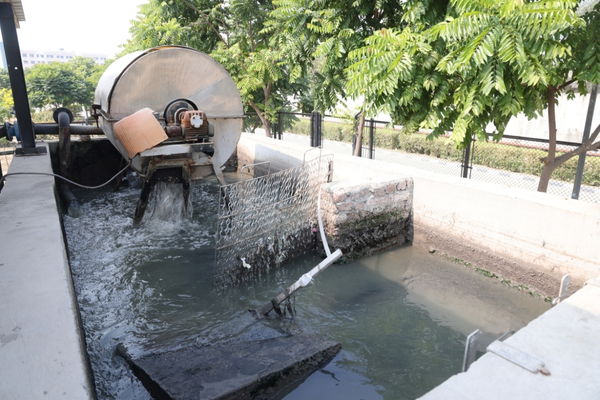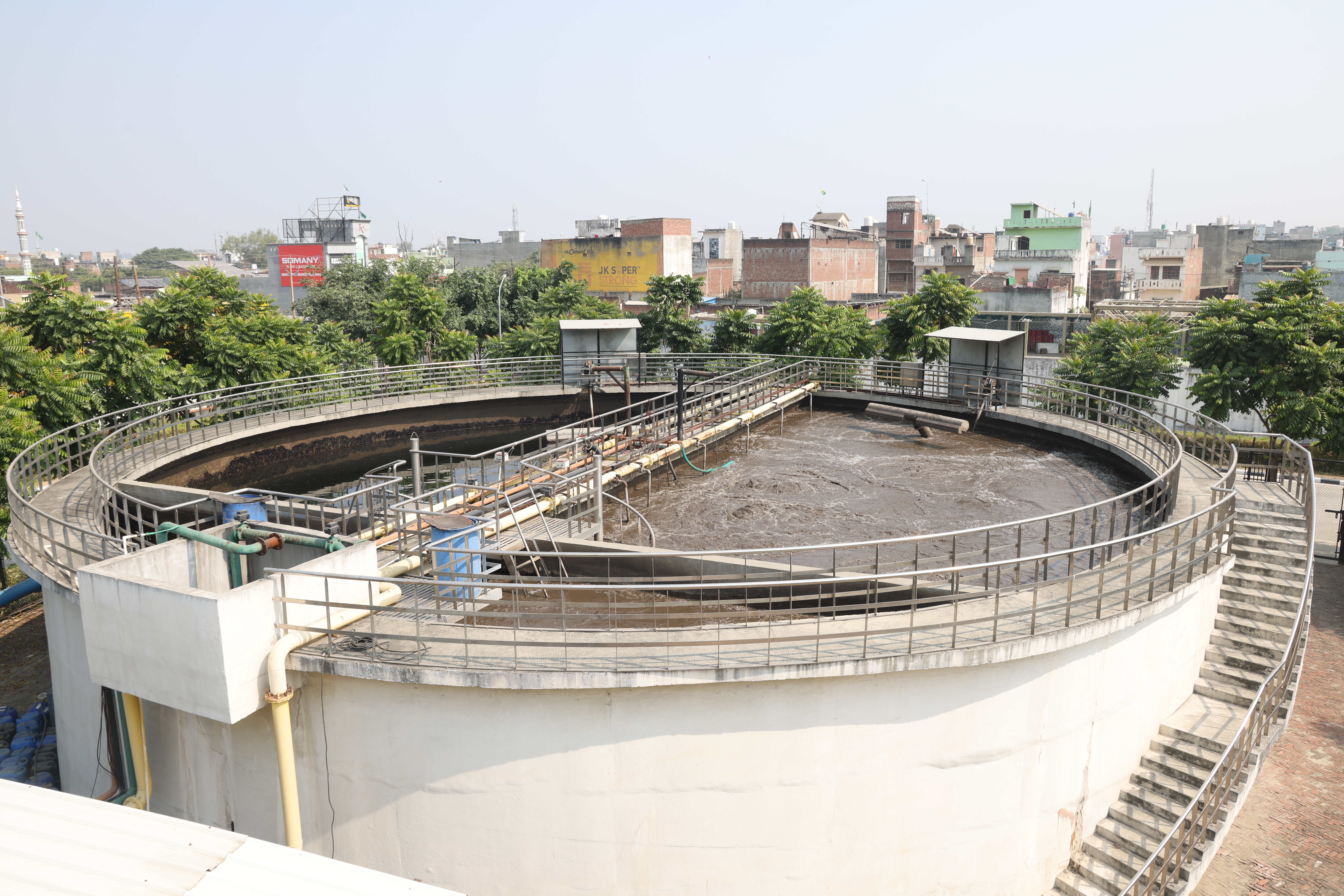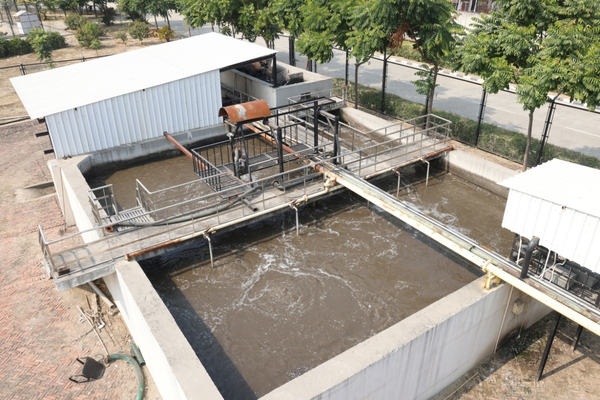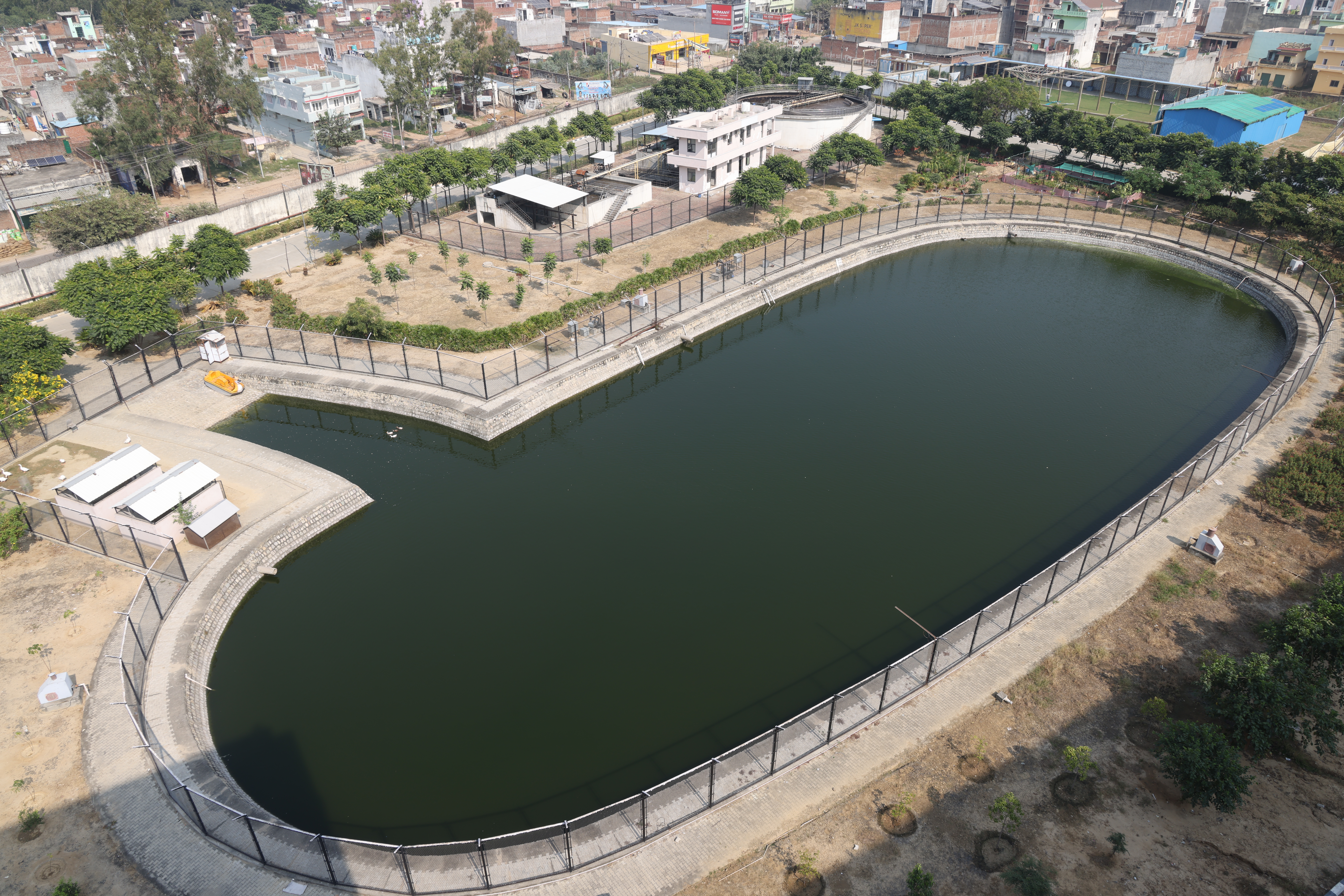
6.4.2 Water reuse measurement
Water reuse on the Teerthanker Mahaveer University campus is closely monitored using flow meters, ensuring accurate measurement and tracking of all water recycled and reused across University operations.
TMU maintains a robust policy to maximize water reuse across all facilities. Our design and operations teams plan and organize activities in the most efficient, environmentally sensitive, and sustainable manner, ensuring optimal utilization of water resources. Water generated from hostel washrooms, kitchens, and residential areas is collected as greywater or wastewater. This wastewater is directed to the University’s Sewage Treatment Plants (STPs), where it undergoes a series of physical, chemical, and biological treatments to remove contaminants. The treated wastewater is then safe for reuse in horticulture, irrigation, significantly reducing the demand for freshwater
Additionally, STP-treated water is utilized for Construction activities such as curing, water sprinkling, and vehicle washing. Campus maintenance, including gardening, floor washing, dust suppression, and sprinkling water is discharged outside the campus, achieving nearly 100% internal reuse of all water consumed. This practice substantially reduces freshwater withdrawal, directly contributing to SDG 6 – Clean Water and Sanitation, particularly. Indicator 6.4.2, which measures water stress through sustainable water withdrawals relative to available resources.
Through these measures, TMU demonstrates sensitivity towards
nature and the environment while fostering a sustainable water management culture on
Key Initiatives for Measuring and Managing Water Reuse
Overview
Teerthanker Mahaveer University (TMU), Moradabad, adopts a sustainability-focused approach to water reuse management. Every drop on campus is measured, treated, reused, and monitored using digital tools and scientific systems, reflecting TMU’s long-term commitment to responsible water stewardship and environmental accountability in alignment with UN SDG 6 — Clean Water and Sanitation.
Water Reuse Measurement Framework
| Component | Description |
|---|---|
| Digital Flow Meters | Installed at inlets, outlets, and reuse points to record real-time data on greywater and treated water volumes. |
| Data Logging | Data monitoring is handled by Concerned authority. |
| Measurement Categories | Greywater (hostels, kitchens, residences etc), effluents (labs, academic blocks), treated outputs (STP/ETP). |
Insights: TMU tracks reuse efficiency to ensure transparency and measurable progress.
Sewage Treatment and Recycling Infrastructure
| Initiative | Implementation at TMU |
|---|---|
| STP Systems | Multi-stage treatment with physical, chemical, and biological processes, ensuring compliance with concerned norms. |
| Reuse Channels | Treated water is used for horticulture, landscaping, flushing, and agricultural irrigation, promoting zero-discharge operations. |
| Water Quality Testing | Conducted regularly to ensure treated water safety and compliance. |
Highlights: TMU’s STP supports resource circularity, reducing dependence on municipal water.
Data Transparency and Reporting
Teerthanker Mahaveer University ensures the robustness of data transparency and reporting to maintain the qualitative aspect of sustainability of water. Here we take care of every single, macro to micro details of concern.
- Water Audits
- Alignment with United Nation's Goal, SDG 06
- Real-time consumption and reuse data
Awareness and Capacity Building
| Activity | Objective |
| Green Campus Workshops | Promote water sensitivity among students and staff. |
| Innovation Challenges | Encourage research in sustainability Goals, Greywater reuse. |
Culture of Sensibility
TMU’s community actively contributes to reducing water footprints through innovation, awareness, and accountability. The Jain philosophy of sustainability is deeply rooted in its core ethical principles. Jainism presents a unique and holistic framework for environmental ethics and sustainable living that continues to be highly relevant in the context of global ecological challenges.
Commitment Statement
At Teerthanker Mahaveer University, sustainability is not just a policy—it’s a measurable mission. Through robust monitoring, engineering, and transparent reporting, TMU ensures that every drop of water is valued, reused, and responsibly managed, contributing to a sustainable future for all.
Overview
Teerthanker Mahaveer University (TMU), Moradabad, consistently measures the impact of its water reuse practices through data analytics, operational audits, and environmental performance indicators.
Operational and Institutional Benefits
| Domain | Observed Impact |
|---|---|
| Infrastructure Optimization | Better sizing and maintenance of STPs through performance analytics. |
| Cost Efficiency | Significant reduction in annual municipal water costs and maintenance expenditures. |
| Policy Formulation | Robust policy for water reuse. |
| Academic Integration | Created real-time learning opportunities for Environmental Science and Engineering students. |
"What gets measured gets managed — and what gets managed improves." TMU’s approach transforms data into sustainable action.
Ecological and Community Impact
| Area of Impact | Key Outcomes |
|---|---|
| Campus Ecosystem | Reduction in groundwater extraction; healthier landscaping through nutrient-rich treated water. |
| Zero-Discharge Initiative | Enhanced compliance with environmental norms, preventing untreated discharge into natural water bodies. |
| Awareness and Sensibility | Students and staff adopt responsible water use practices. |
Commitment Statement
At Teerthanker Mahaveer University, impact measurement is the foundation of sustainability. Through precision tracking, data validation, and transparent disclosure, TMU ensures that every unit of reused water contributes to environmental balance, institutional excellence, and global sustainability benchmarks.









